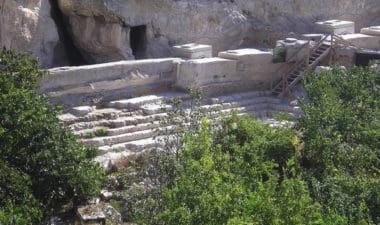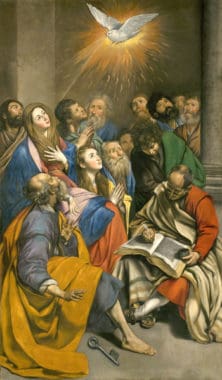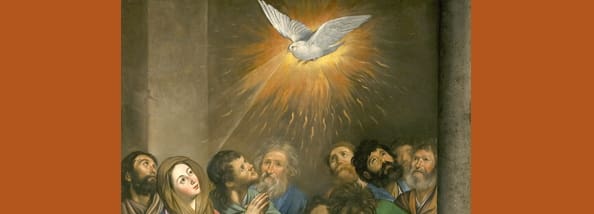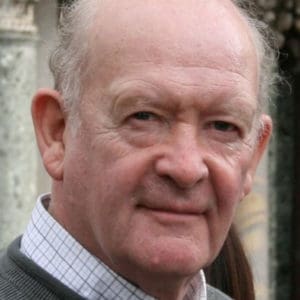A Night in the Holy Sepulchre – Part 2: Pentecost
Editor’s Note: David Torkington continues his reflection on a night in the Holy Sepulchre which he began in part one here.
‘If you want old ideas read new books, but if you want new ideas read old books’. With these words my spiritual director gave me – ‘Abandonment to Divine Providence’ by the Jesuit French mystic Jean Pierre de Caussade SJ, who died in 1751. The book is perhaps better known under the title The Sacrament of the Present Moment, which is more usually used when the book is translated into English, because this title embodies its central idea. I packed the book in my hand luggage and set off for London Airport to lead a group of pilgrims to the Holy Land for my friend Fr. Kenneth Campbell OFM. To thank me for my help, he arranged for me to spend a night in the Holy Sepulchre on the last night of the pilgrimage. I have already described how, after the midnight office, I had had a profound experience that gave me a new understanding of the Resurrection. However while I was praying at Calvary, before the midnight office, I had another experience that gradually led me to an ever deepening understanding of the events that took place on the first Pentecost.
I was overcome to realize that I was totally alone, the only person praying within a matter of meters from where St. John had stood. There was a New Testament open before me at St. John’s account of Christ’s death. The passage that told of the water pouring from the side of Jesus was underlined in red for this was the key moment in his narrative. Once glorified, he could immediately send the Holy Spirit, who he had promise to send at the Last Supper. The outpouring of this mystical life and love had long been likened to an unprecedented effusion of living water, by both the Prophets in the Old Testament and by Jesus himself. St John had actually been there when Jesus had first foretold what he saw for himself, the moment his side had been pierced by the centurion’s lance.

Not long before his life came to an abrupt and agonizing end, Jesus had taken his disciples with him to celebrate the feast of Tabernacles in Jerusalem. On the final day, Jesus and his disciples were gathered at the Pool of Siloam outside the city gate for a key moment in the ritual. A priest walked from the temple with a golden bowl full of water. Then, while it was being poured out into the pool in memory of the rock struck by Moses, a prophecy was read. It promised a massive outpouring of the Holy Spirit when the Messiah would come. This was the moment when Jesus chose to cry out in a loud voice: ‘If any man is thirsty let him come to me. Let the man who believes in me come and drink.’ St John who witnessed the whole event said, ‘He was speaking of the Spirit, who those who believed in him, were to receive; for the Spirit had not yet been sent, because Jesus had not yet been glorified.’ (cf Jn 7:37-39).
Little did St. John know at the time that he would be there to see this outpouring with his own eyes, nor the terrible circumstances that would precede it. So that there could be no doubt, he emphasizes this moment in the Passion narrative more than any other, as you can read for yourself, as I read it for myself on that unforgettable night. However, in the so called ‘real time’ in which St. John and the other apostles lived, they had to wait until after the Ascension for the outpouring of the Holy Spirit on them in the ‘Upper Room’, on the first Pentecost day.
 Once again St. John was there, but this time with the other apostles. They all saw and heard the signs, but more important still, they all experienced the love of Jesus – this time not standing close to them, but actually entering into them through the Holy Spirit. The word apostle means one who is sent, and they were immediately sent, propelled by that same Holy Spirit who possessed them to share the good news with others. For, as promised, this outpouring of the Holy Spirit was for all, for it was sent by Christ, no longer just the King of the Jews, but the King of all creation and of all men and women to the end of time. On that day the Kingdom of God finally came. The Holy Spirit burst out, onto and into the world, like an unstoppable supernatural sea of love. Like a spiritual tsunami, he would sweep out over and into all things, drawing all who would not resist back through Christ into the Ocean of God’s infinite loving. Now at last God’s plan was being implemented, only man’s obduracy could prevent it.
Once again St. John was there, but this time with the other apostles. They all saw and heard the signs, but more important still, they all experienced the love of Jesus – this time not standing close to them, but actually entering into them through the Holy Spirit. The word apostle means one who is sent, and they were immediately sent, propelled by that same Holy Spirit who possessed them to share the good news with others. For, as promised, this outpouring of the Holy Spirit was for all, for it was sent by Christ, no longer just the King of the Jews, but the King of all creation and of all men and women to the end of time. On that day the Kingdom of God finally came. The Holy Spirit burst out, onto and into the world, like an unstoppable supernatural sea of love. Like a spiritual tsunami, he would sweep out over and into all things, drawing all who would not resist back through Christ into the Ocean of God’s infinite loving. Now at last God’s plan was being implemented, only man’s obduracy could prevent it.
I had hardly slept a wink since those very special spiritual experiences in the Holy Sepulchre, until I arrived back in London where I slept for almost twelve hours non-stop. When I woke up it was to experience a question gnawing at my mind. How, could the infinite love of God promised by both the prophets and Jesus himself be received by finite human beings like us? I prayed for enlightenment, but none came. Then something happened on my way home to answer my prayer. It was before the age of Starbucks and Costa Coffee [a British coffeehouse company] and I had been fed up being ripped off at motorway service stations. I found the price of coffee appalling and it invariably tasted like tepid dishwater. So I stopped to buy two 12 volt kettles for the price of one at a camping shop. Now I thought I could make my own coffee in the car. The good news is that it worked. The bad news is that the water took two hours to boil. I was so frustrated that when I returned home I plugged the kettle into the mains for a quick cup of tea. There was a flash, a puff of smoke followed by the smell of burning and my poor kettle gave up the ghost. I had learnt my lesson – 240 volts into 12 volts will not go. Nor would the infinite love of God go into finite human love. My poor kettle had given up the ghost, but my prayer was soon to be answered.
In the Old Testament, the infinite love of God simply would not go into finite human beings. That’s why nobody could even see God and live, and the very thought of his infinite love entering into our finite human being was therefore total inconceivable. In order to save my second kettle from the bin I bought a transformer to change 240 volts into 12 volts. It was then that the penny dropped [an expression that means the moment when something is understood].
After a life given up to loving God, Jesus was finally filled to overflowing with his love in return, in such a way that on his return to his Father he was once more enveloped by the love that he had experienced with him from all eternity. However there was something different that had not happened before. He had re-tuned whence he came, but with a human mind and heart and body, too. Now it was possible for God to do what had never been done before, something that I had never been able to understand, before I’d plugged my kettle into the mains. God needed a transformer too, a supernatural transformer and that transformer was Jesus, who had both a divine and a human nature. Now God was able to communicate his infinite love through the human love of Jesus to other human beings, who had not been able to receive it before.
Now, through Jesus, the whole of humanity could have access to the infinite love of God to the end of time. It was this love that was destined to bring about a whole new world order that Jesus had first called the Kingdom. It was a Kingdom of love. However nowhere in the Gospels did Jesus explicitly say that the Kingdom had come, but only that it was coming. It finally came when, in the immediate aftermath of the Ascension, the infinite loving of the Father was sent out. It was sent out through Jesus, so that, after the Apostles, everyone else could receive it too, if they  had the inner receptivity of heart and mind that many thousands did on that first Pentecost day. This could never have happened before, even the greatest of the patriarchs, prophets and priests in the Old Testament, never received what was open to the humblest human beings, thanks to the transformed and transfigured human nature of Jesus. That’s why Jesus himself had once said that no man born of a woman was greater than John the Baptist, but even the humblest in the kingdom was greater than he. If that’s not good news what is? Nor do we have to go anywhere else than where we are now, to turn to receive it. That’s what I had learnt from reading ‘The Sacrament of the Present Moment’ on the plane home. Thanks to Jean Pierre de Caussade, I could see where the only real journey that matters begins, thanks to the continual outpouring of God’s love that was unleashed on the first Pentecost. It begins from where we are now, by continually turning to receive this love in all that we say and do each day, here and now in the ‘sacrament of the present moment’ where, for those with eyes to see, time touches eternity.
had the inner receptivity of heart and mind that many thousands did on that first Pentecost day. This could never have happened before, even the greatest of the patriarchs, prophets and priests in the Old Testament, never received what was open to the humblest human beings, thanks to the transformed and transfigured human nature of Jesus. That’s why Jesus himself had once said that no man born of a woman was greater than John the Baptist, but even the humblest in the kingdom was greater than he. If that’s not good news what is? Nor do we have to go anywhere else than where we are now, to turn to receive it. That’s what I had learnt from reading ‘The Sacrament of the Present Moment’ on the plane home. Thanks to Jean Pierre de Caussade, I could see where the only real journey that matters begins, thanks to the continual outpouring of God’s love that was unleashed on the first Pentecost. It begins from where we are now, by continually turning to receive this love in all that we say and do each day, here and now in the ‘sacrament of the present moment’ where, for those with eyes to see, time touches eternity.
Art: Pentecostés (Pentecost), Fray Juan Bautista Maino, 1612-1614, PD-US, Restored Traditions, used with permission. Pool of Siloam, Jerusalem, Abraham, September 2005, PD-Worldwide; Holy Spirit Detail of Chair of Saint Peter in St. Peter’s Basilica, Sergey Smirnov, own work 03.05.2008, CC-SA; all Wikimedia Commons.





